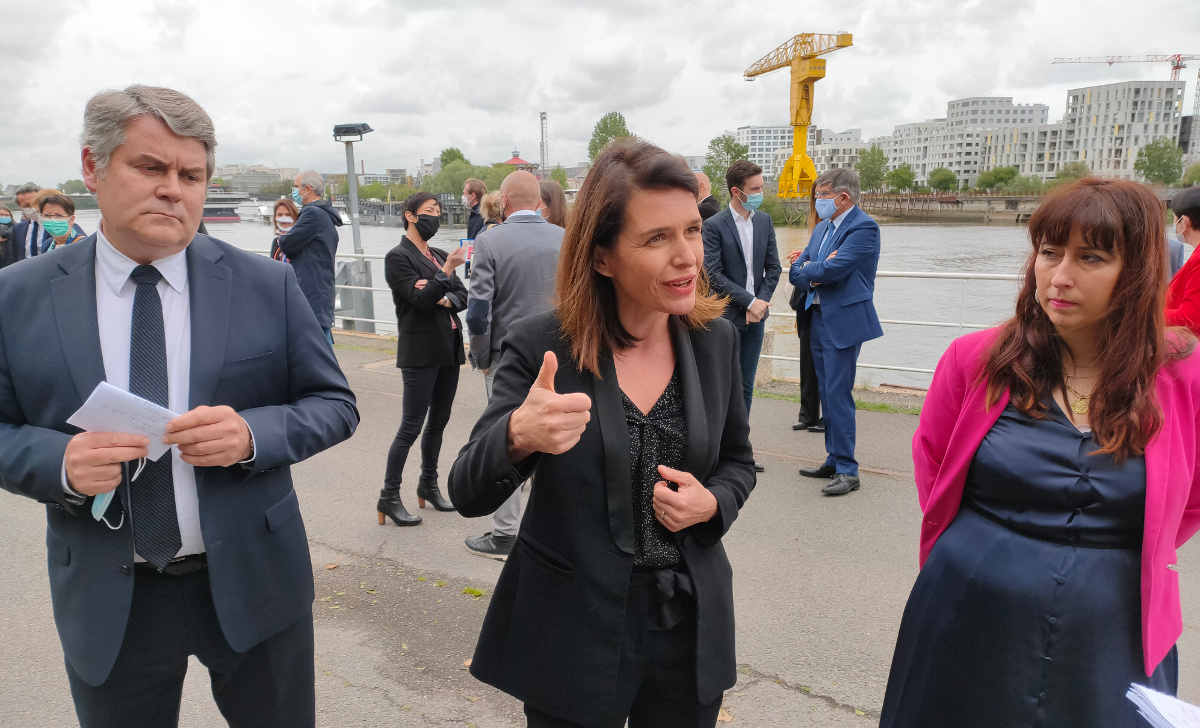According to the candidate president, this drama was the trigger for her awareness: the Region had to be alongside the municipalities to fight against insecurity. Three months before the regional elections, while she is not yet a candidate, Christelle Morancais therefore launches “the regional security pact”. Here is the storytelling told to journalists and in his campaign book.
Morancais in the Wauquiez line
There is no doubt that this drama experienced in Le Mans affected the city’s former municipal councilor. But the opinion polls placing security at the top of the concerns of the French led just as much – if not more – to the creation of this “regional security pact”. A creation which, moreover, is not quite one …
Because this “security” pact in the Loire region is the exact copy, down to the comma, of that of the Auvergne – Rhône-Alpes region launched five months earlier by Laurent Wauquiez. Same name, same type of funding, same amounts. Moreover, Christelle Morancais does not hide it: “my teams worked with those of Laurent Wauquiez. When there are good ideas, you have to duplicate them! For his part, Laurent Wauquiez has copied our “Orientibus” (mobile information stands on the orientation of young people, Editor’s note) “, explains candidate LR.
[LE PITCH] L’#insecurity is one of your major concerns. For us, this is a priority!
We will fight relentlessly against delinquency which is rotting the lives of the inhabitants.# Regionales2021 #PaysDeLaLoire2021 #Security pic.twitter.com/hoYrJae37Z– Christelle MORANÇAIS (@C_MORANCAIS) May 12, 2021
But this “regional security pact” of the Auvergne – Rhône-Alpes region was not unprecedented. Already in 2017, Christian Estrosi was the first to draw an arsenal of aid for municipal police. The injuries left by the attack of July 14, 2016 justified, for the president of the PACA region and mayor of Nice, this intrusion of the regional council in security affairs. Others had already plowed the field of security by financing operations in the direction of high schools and trains, two regional competences. But aid to municipal police, never! And rightly so, since it is not a competence of the Regions, in accordance with the NOTRe law.
Illegal security pacts
The inevitable happened. The prefect challenged before the administrative court the deliberation of the PACA regional council which instituted the “internal security plan”. To the question “Can a region finance expenditure on municipal police equipment and video protection for the benefit of municipalities?” ”, The administrative court of Marseille in its hearing of December 17, 2019, followed the arguments of the prefect. And canceled the deliberation of the Region for incompetence. A slap in the face for Christian Estrosi who must then withdraw his project for subsidies to municipal police.
Extract Legal Bulletin of Local Authorities – Dec 2019
Since then, the PACA Region has reoriented its aid by financing the recruitment of 200 mediators for high schools or railway safety officers. In short, in the field of its legal competences. But Christian Estrosi has not lowered his guard on the financing of municipal police and video protection. The PACA region is currently negotiating with the Ministry of the Interior to set up a convention and thus circumvent the obligation to remain within the framework of regional competences.
The other regions have remained cautious by deploying “safety” plans only in the direction of high schools and trains, their areas of expertise. Only Ile de France, Auvergne – Rhône-Alpes and, at present, the Pays de la Loire region have exceeded their skills by financing equipment for municipal police or video surveillance on public roads.
The great silence of the prefects
For the moment, despite the decision of the Marseille administrative court of December 2019, the prefects are killing people on the issue. Asked by Mediacités on the last born of the “security” pacts, that of the Pays de la Loire, the prefecture of the Region retorts that “the analysis of the file is in progress and that no decision has been taken at this stage”. In prefectural language, this means that we are awaiting instructions from the government.
Taking advantage of the visit of the Minister of the Interior on May 20 in Nantes, Mediacités renewed its questioning on this regional funding in the direction of municipal police. Response from Gérald Darmanin: “The Regions do not have sovereign competence as such, but it is up to them, if they so wish, to support the efforts of the national police or the cities, in particular by subsidizing video protection. But since we are a stone’s throw from the elections, I wouldn’t want to get involved in things that are none of my business! “. The Minister of the Interior would not therefore be competent to remind, via the prefects, the Regions which finance the municipal police, that they are outlawed?
Apparently not. Recontacted on Wednesday, May 26, the office of the Minister of the Interior sends the ball back to the prefecture: “It is up to the prefect of Pays de la Loire to study the pact in question, before deciding on its legality”, we entrusts an adviser to the minister. The electoral period should undoubtedly not facilitate the rapid examination of this pact, which has been on the desk of Didier Martin, the regional prefect, since the end of March…
Socialists of the Region vs Socialists of the Metropolis
In any case, this is enough to make any professor of public law jump and proof that the question is eminently political. In 2017, under the Holland era, Christian Estrosi’s “security” shield was rejected by the prefect (then in 2019 by the administrative court). In 2021, under the Macron era, the same type of “security shield” worn by Laurent Wauquiez in Auvergne-Rhône-Alpes or Christelle Morancais in Pays de la Loire passes without a hitch under the caudine forks of the State.
But the political question does not stop with the simple glance of the latter on these regional devices. The reactions of municipalities to these tempting proposals also differ from one territory to another. In Auvergne-Rhône-Alpes, the ecological mayor of Lyon, Grégory Doucet, refused the financial windfall of the Region. A position in line with that of the Green advisers to the Region, who had voted against the device.
In Pays-de-la-Loire, the Socialists of the Region also voted against, believing that it was “an electoral coup, a sprinkling without vision or priority”. The socialists of the Nantes metropolitan area, on the other hand, hastened to seek regional aid. According to the grant applications that Mediacités was able to consult, the city of Nantes obtained aid of 160,000 euros from the Region for the purchase of CCTV cameras and equipment (vehicles, electric pulse guns, protective vests. balls, electronic reporting devices and telescopic batons).
“Cherry tails” for Pascal Bolo
As for Nantes Métropole, it can count on the support of the regional council to the tune of 225,500 euros (81,200 euros for its urban supervision center, 44,300 euros for cameras in Saint-Herblain and 50,000 euros each for those of Vertou and Basse-Goulaine). In total, therefore, for the Nantes conurbation: 385,500 euros out of the 1.6 million granted so far by the Region. Or 24% of the regional budget. “A cherry tail!” »For Pascal Bolo, vice-president (PS) of Nantes Métropole in charge of finance and deputy mayor of Nantes for security.
“Cherry tails” that he does not refuse despite the opposition of the Socialist elected representatives of the Region on this measure “If Ms. Mor Anglais wishes to contribute, even modestly, to the implementation of our policy, I do not see in the name of what purity, I would go and give him back his money! »Launches Pascal Bolo. “Everyone knows, except Ms. Morancais, that security is not a competence of the regional council, except on one point. The fight against dropping out of school can be considered as a preventive element in the fight against delinquency. Ms. Morancais would have done better to put this money from the regional pact to fight against dropping out of school instead of demagoguery on a subject that is not hers ”concludes Mr. Security from Nantes.
Critics swept aside by the President of the Region. “There is real enthusiasm for our regional security pact. 35 municipalities from all political orientations are supported. This proves that there is a real need, ”argues Christelle Morancais. And when we remind him that security is not a regional competence, the answer bursts out “In matters of health either, and there nobody sees anything wrong there!” “
With the help of the region @paysdelaloire @C_MORANCAIS the #police municipal #SablesdOlonne acquires pedestrian cameras
Better equipped & protected, our police officers will be better armed to face the different forms of rejection of authority#dissuasion #Pacterégional #security pic.twitter.com/yzFzKk4MOG
– Yannick MOREAU ن (@YannickMOREAU) May 25, 2021
Orphan, de Rugy and Garot more cautious
To drive the safety nail, the president-candidate intends, if she is re-elected, to appoint a police officer to the post of “vice-president in charge of security”. The name of the future “1st cop in the Region” is even unveiled: it will be Benoit Barret, police major in Sarthe and deputy national secretary of the Alliance Police Nationale union. Not quite a stranger in the media landscape. A regular on the sets of “all info” channels, Benoit Barret also answered questions from David Dufresne in his film A country that stands wise. “Benoit Barret, it’s a baby Sarko! “Laughs the journalist and director, interviewed by Mediacités. “As a member of a union created from scratch by the former interior minister Nicolas Sarkozy, he follows the Alliance political line by appearing on the list of Christelle Morancais”.
Unlike the head of the LR list, the other candidates for the regional election, on the other hand, took care, on this issue of security, to remain within the scope of regional competences. François de Rugy (LREM) thus intends to “act on the security of high schools and transport”. As for the EELV – France Insoumise candidate, Matthieu Orphelin, he will begin by carrying out a “high school safety” audit before strengthening “the educational presence” in schools and prevention teams on trains. For the candidate RN Hervé Juvin, it is advisable to “create a regional police force which intervenes in transport and around high schools” and to “develop video surveillance in rural areas”. Finally, the socialist candidate Guillaume Garot intends to write a “security and proximity” pact to “strengthen the human presence in all places under the responsibility of the Regional Council (stations, TER, high schools)”. In addition, the head of the list “the spring of the Pays de la Loire” announces funds for “the prevention and protection against violence, school bullying and radicalization”.
–


